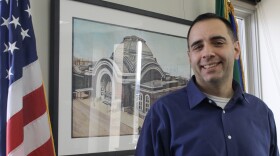When Stephanie Bartella, 46, saw the news on Facebook that the City of Tacoma would be piloting a guaranteed income program, it seemed too good to be true.
"I thought 'Oh, this will never happen to me,'" Bartella said. But the single mom of four decided to apply anyway, and she was randomly selected to join the Growing Resilience In Tacoma, or GRIT, program.
Every month for the past six months, $500 has been showing up in her bank account. The money has no strings attached and is for her to spend as she pleases, courtesy of the city.
Even now, Bartella still doesn't quite believe it.
"There's that fear that if this isn't real, and I had to pay it back, I don't have it!"
The GRIT program is one of dozens of experiments around universal basic income currently being piloted by mayors across the country.
Tacoma's program is funded by a mix of grants and private donors, including $500,000 from Twitter co-founder Jack Dorsey. It's being studied by independent researchers at the University of Pennsylvania.
For the pilot, 110 Tacoma families were selected. All recipients are from one of four zip codes: Eastside (98404), Hilltop (98405), South Tacoma (98409) or the South End (98408). They are single income households with children where the adult is working but their income is still between 100% and 200% of the federal poverty level.
Bartella works full time at a small college. She felt like she was on the right track: she'd gotten out of an unhealthy relationship, went back to school, and bought a home. But she was still contemplating getting a second full time job to make ends meet.
"I was still putting my utility payment on my credit card," Bartella said. "I was still like making all these decisions of what don't I do? What can't I have?"
With the extra $500 a month, Bartella is able cover her family's basic needs and to help pull herself out of debt.
That's the best use of a program like this according to Tacoma Mayor Victoria Woodards. There's no concern that a guaranteed income of this amount would pull someone out of the workforce entirely.
"People are (just) trying to get ahead," Woodards said.
Abigail Lawson is running the program for the United Way of Pierce County and has observed how the families are spending the extra money. Most, like Bartella, are putting it toward basic needs.
"When I was onboarding one of our recipients, she and her daughter were houseless," Lawson said. "And the last time that I chatted with them, they were in safe apartment."
One woman took her elderly mother across the country to attend a close friend's funeral. One family is saving for a down payment on a home. Lawson said the most luxurious spend was a family with six kids that went ice skating for the first time after Christmas.
While she hasn't made any extravagant purchases, Bartella said she does feel some discomfort sharing her participation in the program. She's only told a few close friends and family. She questioned whether she actually deserved the unrestricted money.
"It was a huge leap to get past the guilt and shame of 'who am I to accept this?'" Bartella said. "There is that assumption that you always have to be doing something to be deserving of receiving, and it's just strange because we are always doing something. We are."
A guaranteed basic income isn't a new idea. Bartella said she first heard about it during Andrew Yang's presidential campaign. Other localities in Washington have tried similar programs.
King County Council Member Girmay Zahilay initiated a similar independent pilot, giving 10 participants in South King County $1000 per month over the last year. State Representative Liz Berry introduced a bill during the last legislative session to create a statewide guaranteed income program but that bill stalled in committee.
Woodards said there's no way a local government can sustain this type of program indefinitely. She and the other mayors running similar pilot programs across the country hope these experiments will lead to a federal program.
The biggest benefit of the funds, Bartella said, is that it's given her time back.
"I just work one full time job and that's great," Bartella said. "It allows me time to go to my parents' house on the weekend and help out with them. My daughter just had her first kid and so I'm a grandma and I get time to be with him."
While the money mostly is going to her basic needs, Bartella is looking forward to being able to go to her nephew's wedding this summer. It's something she may have once skipped when constantly asking herself, "what don't I do? What can't I have?"






